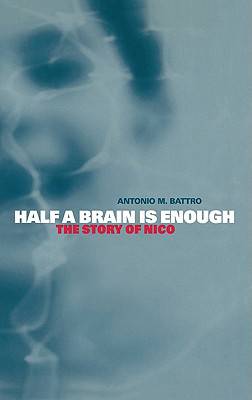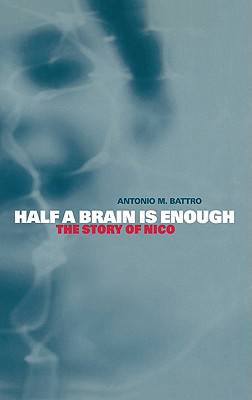
- Retrait gratuit dans votre magasin Club
- 7.000.000 titres dans notre catalogue
- Payer en toute sécurité
- Toujours un magasin près de chez vous
- Retrait gratuit dans votre magasin Club
- 7.000.0000 titres dans notre catalogue
- Payer en toute sécurité
- Toujours un magasin près de chez vous
Description
Half a Brain is Enough is the extraordinary story of Nico, a three-year-old boy who was given a right hemispherectomy to control his severe intractable epilepsy. Antonio Battro, a distinguished neuroscientist and educationalist, describes his work with Nico over several years and explains how a boy with only half a brain has developed into a bright child with relatively minor physical and mental impairment. Eight years later, he runs and plays with only a slight limp. So far, there is no significant cognitive or affective disorder and it appears that Nico's so-called right-hemisphere skills--mathematics, visual arts, and music--have migrated to the left hemisphere. At school, he performs as a child of his age in arithmetic and music; only his draftsmanship and handwriting are poor for his age, but he has not lost his cognitive spatial ability. Battro and his colleagues have been studying and teaching Nico with computers and he is mastering written language with a word processor and is able to make good graphic designs with a computer. Nico performs well above average verbally, a left-brain skill. Battro charts what he calls Nico's "neuroeducation" with humor and compassion in a book that is part case history and part a study of consciousness and the brain. Filled with fascinating details about Nico's abilities, Half a Brain is Enough also includes the latest information about brain surgery, neuronal architecture, and the use of technology in education. Throughout the book, it is clear that Battro and his collleagues are delighted with Nico's progress and grateful for the opportunity to help him and learn with him. Antonio Battro received his MD from the School of Medicine at the University of Buenos Aires and his PhD in Psychology from the University of Paris. He has worked with Jean Piaget, Marvin Minsky, and others and is well known around the world for his publications in cognitive development. He lives in Buenos Aires, Argentina.
Spécifications
Parties prenantes
- Auteur(s) :
- Editeur:
Contenu
- Nombre de pages :
- 136
- Langue:
- Anglais
- Collection :
- Tome:
- n° 5
Caractéristiques
- EAN:
- 9780521783071
- Date de parution :
- 08-01-01
- Format:
- Livre relié
- Format numérique:
- Genaaid
- Dimensions :
- 158 mm x 236 mm
- Poids :
- 331 g

Les avis
Nous publions uniquement les avis qui respectent les conditions requises. Consultez nos conditions pour les avis.






